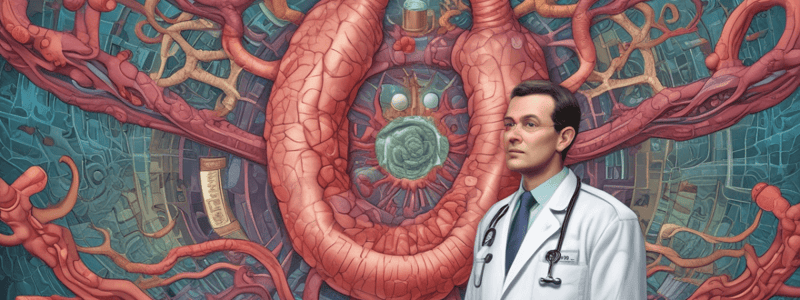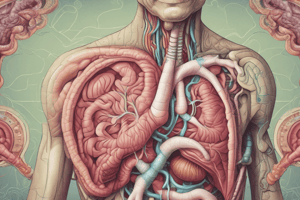Podcast
Questions and Answers
What is the primary goal of interprofessional and nursing care in bowel obstruction?
What is the primary goal of interprofessional and nursing care in bowel obstruction?
- To treat underlying etiologies
- To monitor for complications
- To clear and reverse the obstruction (correct)
- To alleviate symptoms
What is the name of the surgical procedure that involves wrapping and sewing the fundus around the esophagus below the diaphragm?
What is the name of the surgical procedure that involves wrapping and sewing the fundus around the esophagus below the diaphragm?
- Herniorrhaphy
- Fundoplication (correct)
- Herniotomy
- Gastropexy
What is the term for the assessment of stool using a chart?
What is the term for the assessment of stool using a chart?
- Fecal Assessment Scale
- Bristol Stool Scale (correct)
- Gastrointestinal Assessment Tool
- Stool Evaluation Chart
What is the name of the bacteria that is a common etiology of peptic ulcer disease?
What is the name of the bacteria that is a common etiology of peptic ulcer disease?
What is the term for the paralysis of the intestinal muscles, leading to a lack of peristalsis?
What is the term for the paralysis of the intestinal muscles, leading to a lack of peristalsis?
What is the term for the surgical removal of a polyp or tumor?
What is the term for the surgical removal of a polyp or tumor?
What is the term for the inflammation of the peritoneum?
What is the term for the inflammation of the peritoneum?
What is the term for the X-ray examination of the abdominal cavity?
What is the term for the X-ray examination of the abdominal cavity?
What is the term for the attachment of the stomach to the abdominal wall?
What is the term for the attachment of the stomach to the abdominal wall?
What is the term for the partial or complete blockage of the intestine?
What is the term for the partial or complete blockage of the intestine?
Which of the following conditions is most likely to occur as a result of delayed emptying of the stomach?
Which of the following conditions is most likely to occur as a result of delayed emptying of the stomach?
What is the primary cause of angina-like chest pain in GERD?
What is the primary cause of angina-like chest pain in GERD?
Which of the following is a risk factor for esophageal cancer?
Which of the following is a risk factor for esophageal cancer?
What is the primary difference in pain relief between duodenal ulcers and gastric ulcers?
What is the primary difference in pain relief between duodenal ulcers and gastric ulcers?
What is the primary method of diagnosis for GERD?
What is the primary method of diagnosis for GERD?
In irritable bowel syndrome, what is the most common symptom?
In irritable bowel syndrome, what is the most common symptom?
What is the primary complication of hiatal hernia?
What is the primary complication of hiatal hernia?
What is the primary goal of nonsurgical management of ulcerative colitis?
What is the primary goal of nonsurgical management of ulcerative colitis?
What is the primary etiology of hiatal hernia?
What is the primary etiology of hiatal hernia?
What is the most common complication of Crohn's disease?
What is the most common complication of Crohn's disease?
What is the term for something that is similar to, but not exactly the same as, another condition?
What is the term for something that is similar to, but not exactly the same as, another condition?
What is the primary difference between ulcerative colitis and Crohn's disease?
What is the primary difference between ulcerative colitis and Crohn's disease?
What is the primary nursing management for GERD?
What is the primary nursing management for GERD?
What is the primary difference between sliding and paraesophageal hiatal hernias?
What is the primary difference between sliding and paraesophageal hiatal hernias?
What is the primary goal of surgical management of Crohn's disease?
What is the primary goal of surgical management of Crohn's disease?
What is the primary cause of diverticulitis?
What is the primary cause of diverticulitis?
What is the primary complication of esophagitis?
What is the primary complication of esophagitis?
What is the primary diagnostic test for liver disease?
What is the primary diagnostic test for liver disease?
What is the primary symptom of irritable bowel syndrome?
What is the primary symptom of irritable bowel syndrome?
What is the primary medication therapy for ulcerative colitis?
What is the primary medication therapy for ulcerative colitis?
What is the primary reason for the creation of alternative pathways in cirrhotic livers?
What is the primary reason for the creation of alternative pathways in cirrhotic livers?
What is the primary cause of jaundice in cirrhotic patients?
What is the primary cause of jaundice in cirrhotic patients?
What is the primary complication of esophageal varices?
What is the primary complication of esophageal varices?
What is the primary cause of ascites in cirrhotic patients?
What is the primary cause of ascites in cirrhotic patients?
What is the primary cause of hepatic encephalopathy in cirrhotic patients?
What is the primary cause of hepatic encephalopathy in cirrhotic patients?
What is the primary characteristic of fibrotic tissue in cirrhotic livers?
What is the primary characteristic of fibrotic tissue in cirrhotic livers?
What is the primary cause of portal hypertension in cirrhotic patients?
What is the primary cause of portal hypertension in cirrhotic patients?
What is the primary complication of hepatorenal syndrome?
What is the primary complication of hepatorenal syndrome?
What is the primary cause of anorexia in cirrhotic patients?
What is the primary cause of anorexia in cirrhotic patients?
What is the primary cause of edema in cirrhotic patients?
What is the primary cause of edema in cirrhotic patients?
Flashcards are hidden until you start studying
Study Notes
Gastroesophageal Reflux Disease (GERD)
- Chronic reflux of gastrointestinal contents into the esophagus
- Causes:
- Incompetent lower esophageal sphincter (LES)
- Pyloric stenosis
- Hiatal hernia
- Delayed emptying
- Motility problems
- Clinical manifestations:
- Heartburn
- Substernal and retrosternal pain
- Indigestion
- Acid regurgitation
- Esophageal irritation
- Dysphagia
- Angina-like chest pain
- Respiratory problems
Complications of GERD
- Esophagitis
- Esophageal scarring and strictures
- Airway inflammation, aspiration, and scarring
- Barrett's esophagus
- Metaplasia of epithelials in the lower esophagus
- Risk factor for esophageal cancer
Diagnostic Tests for GERD
- Endoscopy
- Mucosal biopsy
- Barium swallow (upper GI series)
- Fluoroscopy/X-ray
- Motility studies
- Esophageal pH monitoring
Interprofessional and Nursing Management of GERD
- Diet: low-fat, high-fiber, high water concentration
- Avoid foods that increase acid production
- Stop smoking
- Maintain a healthy weight
- Avoid eating two hours before bedtime
- Elevate the head of the bed (HOB)
- Medications: antacids, H2 antagonists, and proton pump inhibitors (PPIs)
Hiatal Hernia
- Stomach herniation into the esophagus and diaphragm
- 2 types: sliding and paraesophageal
- Clinical manifestations:
- Similar to GERD
- Etiology and pathophysiology:
- Structural: weakened muscle in the diaphragm and esophagogastric opening
- Increased intra-abdominal pressure
- Complications:
- GERD
- Esophagitis
- Ulcers
- Hemorrhage
- Strangulation
- Aspiration
- Diagnostic studies:
- Same as GERD
- Nursing and interprofessional management:
- Improve the cause of increased intra-abdominal pressure
- Symptom management
- Pain control
- Stomach acid control
- Surgical repair (herniotomy, herniorrhaphy, fundoplication, gastropexy)
Bowel Obstructions
- Clinical manifestations:
- Nausea and vomiting
- Pain (colicky or visceral)
- Interruption in bowel habits
- Abdominal distension
- Changes in bowel sounds (BST)
- Complications:
- Atelectasis
- Malnutrition
- Hypovolemia
- Rupture
- Infection (peritonitis)
- Types of bowel obstructions:
- Functional (ileus)
- Mechanical (simple)
- Pyloric
- Intestinal (more common in the small bowel)
- Diagnostic studies:
- Abdominal X-rays
- CT scan
- Contrast oral/enema
- Sigmoidoscopy or colonoscopy
- Blood tests (CBC, metabolic panel)
Gastric Disorders
- Typical clinical manifestations:
- Nausea and vomiting
- Pain
- Hemorrhage
- Anorexia
- Weight loss
- Flatus
- Complications:
- Neoplasm
- Hypovolemia
- Perforations
- Obstruction
Peptic Ulcers
- Epigastric mucosal "craters"
- Mucosal damage and increased presence of acid and/or pepsin
- Common etiologies:
- Stress
- H. pylori
- NSAIDs
- MOA:
- Inflammation
- Cytokine damage
- H. pylori toxins
- Nursing considerations and interventions:
- Manage pain
- Control stomach acid
- Prevent complications
Inflammatory Disorders
- Etiologies:
- Increased immune sensitivities to intestinal flora
- Epithelial dysfunction
- Epigenetics
- Most common: Crohn's disease and ulcerative colitis
- Irritable bowel syndrome (IBS):
- "Brain-gut" disorder
- Increased incidence with stress, anxiety, and depression
- Symptoms:
- Abdominal bloating and distension
- Pain
- Increased flatus
- Diarrhea or constipation
- Nausea
- Relieved with passing flatus and bowel movement, treat underlying etiologies (e.g., coping, diet, etc.)
Ulcerative Colitis
- Inflammation and ulceration of the mucosa and submucosa of the colon
- Clinical manifestations:
- Loose stools with blood and mucus
- Malabsorption
- Thickening/scarring of the colon wall
- Other symptoms:
- Hemorrhage
- Strictures
- Perforation
- Toxic megacolon
- Colonic dilation
- Diagnostic tests:
- CBC
- Electrolytes
- Serum protein levels
- Stool cultures
- Sigmoidoscopy and/or colonoscopy
- Biopsy specimens
- Nonsurgical management:
- Rest the bowel
- Control inflammation
- Combat infection
- Correct malnutrition
- Stress management
- Symptomatic relief
- Medication therapy:
- Corticosteroids
- Antidiarrheal drugs
- Antibiotics
- Surgical management:
- Colectomy (partial or total)
- Pouch system
- Total colectomy with a continent (Kock's) ileostomy
- Total colectomy with ileoanal anastomosis (J pouch)
Crohn's Disease
- Idiopathic inflammatory disease
- Affects the full thickness of the small intestine and/or the colon
- Affects any part of the GI tract from the mouth to the anus
- Complications:
- Fat and/or gluten intolerance
- Bowel wall thickening
- Strictures and obstruction
- Abscesses or fistulas
- Malabsorption of vitamins and nutrients
- Clinical manifestations:
- Nonspecific complaints
- Diarrhea (non-bloody)
- Constipation
- Abdominal pain
- Fatigue
- Fever
- Weight loss
- Diagnostic tests:
- Laboratory studies
- Endoscopy with biopsy
- Upper GI barium studies
- Nonsurgical management:
- Nutrition
- Medication therapy
- Symptom management
- Fluid and electrolyte therapy
- Skin care
- Surgical management:
- Not curative
- Small bowel resection and ileocecal resection
- Stricturoplasty
Diverticulitis
- Diverticulosis: outpouchings in the intestinal walls (diverticula)
- Diverticulitis: inflammation of diverticula
- Cause: (believed) chronic low fiber diet
- Risk factors:
- Age
- Gender
- Clinical manifestations:
- Intermittent left lower quadrant (LLQ) pain
- Constipation
- Diverticulitis:
- Low-grade fever
- Nausea
- Abdominal pain
- Constipation
- Rectal bleeding
- Abdominal distension
- Rebound tenderness
- Symptoms of diverticular perforation:
- Tender mass in the rectal area
- Hypotension
- Dehydration
Liver Disorders
- Diagnostic tests for liver diseases:
- Serum labs
- Liver biopsy (gold standard)
- Abdominal X-ray/CT scan
- MRI
- Ultrasound (US)
- Endoscopic retrograde cholangiopancreatography (ERCP)
- Liver disease (cirrhosis):
- Regenerative properties decline and/or inhibited
- Fibrotic tissue
- Vascular restructuring and alternative pathways
- Portal hypertension
- Causes:
- Alcohol
- Hepatitis
- Viral
- Autoimmune
- Drugs and toxins
- Liver cancers
- Biliary disease
- Genetics
- Nonalcoholic fatty liver
- Clinical manifestations:
- Early:
- Anorexia
- Dyspepsia
- Increased flatulence
- Nausea and vomiting
- Change in bowel habits
- RUQ and/or epigastric pain
- Edema
- Hepatic stretching
- Fever
- Weight loss
- Later:
- Jaundice
- Peripheral edema and ascites
- Pruritis
- Skin lesions
- GI bleed
- Hepatic encephalopathy
- Hepatorenal syndrome
- Portal hypertension
- Early:
- Complications:
- Portal hypertension
- Ascites
- Esophageal varices
- Jaundice
- Encephalopathy
Studying That Suits You
Use AI to generate personalized quizzes and flashcards to suit your learning preferences.



